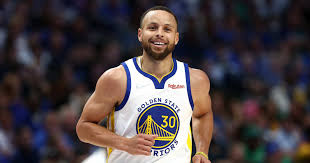When sports historians reflect on the defining athletes of the 21st century, the name Stephen Curry is bound to echo loudly. Not for sheer physical dominance or vertical leap, but for how he fundamentally changed the way basketball is played, coached, and consumed — from youth leagues to the NBA’s biggest stage.
Stephen Curry didn’t just become a superstar. He became a revolution.
Humble Beginnings, Unimaginable Impact
Born in 1988 in Akron, Ohio the same city as LeBron James Curry grew up in Charlotte, North Carolina, under the shadow of his father Dell Curry, an NBA veteran known for his shooting touch. Despite his basketball pedigree, Stephen wasn’t heavily recruited out of high school. Critics questioned his size, strength, and ability to compete at a high level.
He eventually landed at Davidson College, a small liberal arts school not known for basketball excellence. It was there that Curry first captured national attention leading Davidson to the Elite Eight in the 2008 NCAA Tournament and lighting up defenses with his deep shooting and quick release.
But few could have predicted what would follow in the NBA.
The NBA and the Rise of a New Era
Drafted 7th overall by the Golden State Warriors in 2009, Curry’s early NBA years were plagued by ankle injuries. Many wondered if he could sustain the physical toll of an 82-game season. But once healthy, Curry blossomed and the league would never be the same.
His breakout season came in 2014-2015 when he won his first MVP award and led the Warriors to an NBA Championship. But that was just the beginning. In the 2015-2016 season, Curry became the first unanimous MVP in league history, averaging over 30 points per game and hitting a then-record 402 three-pointers in a single season many of them from jaw-dropping distances.
His deep range, lightning-quick release, and ability to shoot off the dribble made defenders uncomfortable in unfamiliar areas of the court. Suddenly, defending 25 feet from the basket became a necessity.
The “Curry Effect”: A Strategic Revolution
Curry’s biggest impact isn’t just in the record books it’s in the playbooks. The “Curry Effect” refers to the strategic transformation he sparked throughout basketball:
- Increased Emphasis on Spacing: Teams began prioritizing spacing and perimeter shooting. Big men had to evolve or become obsolete. Traditional post play declined in favor of stretch forwards and centers who could shoot.
- Rise in Three-Point Volume: In 2012, NBA teams averaged about 18 three-point attempts per game. By 2025, that number has more than doubled largely due to the success of the Warriors’ system with Curry at the center.
- Youth Imitation: Across gyms and playgrounds, kids began pulling up from half-court, emulating Curry’s signature confidence and range. Coaches began teaching the three-point shot earlier in player development.
He didn’t just normalize the deep shot he glamorized it. Curry made the long-range jumper the most exciting and efficient weapon in basketball.
Beyond the Court: Character and Cultural Influence
Off the court, Curry represents humility, faith, and hard work. In a league that often spotlights larger-than-life personalities, Curry remained grounded approachable, family-oriented, and focused on team success over personal accolades.
He’s also used his platform to make a broader impact supporting education initiatives, advocating for gender equality in sports (especially through support for women’s basketball), and investing in youth development. Through his company, Unanimous Media, Curry has begun shaping narratives in entertainment as well.
His success also disrupted marketing trends. Brands and fans once fixated on high-flying athletes and dominant physiques. Curry, listed at 6’2″, showed that skill, intelligence, and relentless practice can build a global icon.
Legacy: The Most Influential Player of His Generation?
Statistically, Curry has solidified himself among the greats multiple MVPs, four NBA championships (as of 2022), and the all-time leader in three-pointers made. But his real legacy lies in how he changed the philosophy of basketball.
He didn’t just stretch the floor. He stretched the imagination of what was possible.
While others have dominated eras Jordan with his will, LeBron with his versatility, Kobe with his killer instinct Curry did something arguably rarer: he transformed the rules of engagement.
For this reason, many believe Stephen Curry is the most influential basketball player since Michael Jordan not because he mimicked the past, but because he created the future.
Stephen Curry’s story is not just one of personal achievement. It’s a blueprint for how innovation, resilience, and vision can change an entire sport. From a lightly recruited college guard to a global icon, Curry didn’t just win he redefined the very meaning of winning.
In doing so, he didn’t just play the game. He rewrote it.

